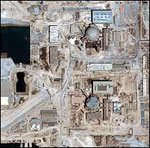 Washington Post: Iran and six world powers held their first talks in more than a year on Monday, with Iran’s nuclear program dominating the discussions, according to officials familiar with the proceedings.
Washington Post: Iran and six world powers held their first talks in more than a year on Monday, with Iran’s nuclear program dominating the discussions, according to officials familiar with the proceedings.
The Washington Post
By Glenn Kessler
Washington Post Staff Writer
Tuesday, December 7, 2010; A13
 GENEVA – Iran and six world powers held their first talks in more than a year on Monday, with Iran’s nuclear program dominating the discussions, according to officials familiar with the proceedings.
GENEVA – Iran and six world powers held their first talks in more than a year on Monday, with Iran’s nuclear program dominating the discussions, according to officials familiar with the proceedings.
Coming into the discussions, Iranian officials had vowed that the nuclear program was not on the table. But in what seems like a promising sign, one official said that “70 to 80 percent” of the more than three hours of morning talks was focused on the program. The parties then broke for a lunch of duck and arctic char, though most of the Iranians ate separately.
The two sides subsequently held a series of bilateral meetings before reconvening at about 6 p.m. for 90 minutes of plenary discussions that focused on an Iranian presentation. The United States, which held a rare bilateral meeting with Iranian officials last year, did not hold such a meeting this time, a U.S. official said, adding that other nations – including Russia and China – did so and “delivered the unified message” that Iran must address concerns about its nuclear program.
The talks will resume Tuesday morning, a Western official said, suggesting that progress is being made. Before arriving, the Iranian delegation had said the talks would last one day.
No officials involved were willing to be quoted by name until after the discussions, and even then details were scarce.
The chief Iranian negotiator, Saeed Jalili of Iran’s Supreme National Security Council, began his presentation by pointedly noting the recent killing of a top Iranian nuclear scientist, according to officials and Iran’s state-run Mehr News Agency. The lead negotiator for the six world powers – European Union foreign policy chief Catherine Ashton – said that all six countries present condemned the assassination, and the discussion turned to other matters.
Jalili focused on the mutual mistrust between Iran and the other nations at the table, which were the United States, Russia, China, Britain, France and Germany, according to a source close to the talks. Jalili raised the possibility of working together on regional issues and the other nations responded that “the heart of the mistrust is Iran’s nuclear program,” the source said.
A Western official said that after Jalili spoke, representatives for each of the other nations urged that Iran’s nuclear program be discussed.
The atmosphere of the talks was described as “constructive” and “positive” – diplomatic terms of art that shed little light on the actual tenor of the meetings. In contrast to the 18th-century villa where last year’s talks were held, the parties met this time in a bland building under gray, rainy skies.
The major powers hope to draw Iran into a sustained discussion about its nuclear program, including winning the nation’s agreement to more enhanced international inspections, full disclosure on all aspects of its program and ultimately compliance with four U.N. Security Council resolutions that since 2006 have called for a suspension of Iran’s nuclear enrichment programs. The other nations have acknowledged that Iran has a right to nuclear power for peaceful purposes but say the country’s activities must be stopped until questions are addressed.
Iran has refused to curtail its nuclear ambitions. On the eve of the talks, officials in Tehran said the nation would begin to use domestically produced uranium concentrates, known as yellowcake. Iranian officials have repeatedly denied that they have any interest in nuclear weapons.
The talks last year resulted in several announcements, including that Iran had tentatively agreed to give up much of its enriched uranium in exchange for fuel for a medical research reactor and that the two sides would meet again within a month. But the deal fell apart and no meetings were held for 14 months.


